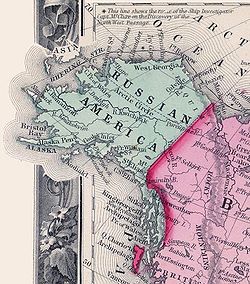Russian America
| Russian America Русская Америка Russkaya Amerika |
||||||
| Colony of the Russian Empire | ||||||
|
||||||
|
||||||
| Russian America in 1860 | ||||||
| Capital | New Archangel | |||||
| Emperor | ||||||
| • | 1784–1796 | Catherine the Great | ||||
| • | 1796–1801 | Paul I | ||||
| • | 1801–1825 | Alexander I | ||||
| • | 1825–1855 | Nicholas I | ||||
| • | 1855–1867 | Alexander II | ||||
| History | ||||||
| • | Company Charter[a] | 8 July 1784, 1796 | ||||
| • | Alaska Purchase | 18 October 1867 | ||||
| Today part of |
|
|||||
| a. ^ The Russian-American Company was chartered by the Emperor in 1799, to govern Russian possessions in North America on behalf of the Russian Empire. | ||||||
 |
| History of Alaska |
|---|
| Prehistory |
| Russian America (1733–1867) |
| Department of Alaska (1867–1884) |
| District of Alaska (1884–1912) |
| Territory of Alaska (1912–1959) |
| State of Alaska (1959–present) |
| Other topics |
Russian America (Russian: Русская Америка, Russkaya Amerika) was the name of the Russian colonial possessions in North America from 1733 to 1867. Settlements spanned parts of what are now the US states of California, Alaska, and two ports in Hawaii. Formal incorporation of the possessions by Russia did not take place until the Ukase of 1799 which established a monopoly for the Russian–American Company and also granted the Russian Orthodox Church certain rights in the new possessions. Many of its possessions were abandoned in the 19th century. In 1867 Russia sold its last remaining possessions to the United States for $7.2 million ($120 million in 2013 dollars).
The earliest written accounts indicate that the first Europeans to reach Alaska came from Russia. In 1648 Semyon Dezhnev sailed from the mouth of the Kolyma River through the Arctic Ocean and around the eastern tip of Asia to the Anadyr River. One legend holds that some of his boats were carried off course and reached Alaska. However, no evidence of settlement survives. Dezhnev's discovery was never forwarded to the central government, leaving open the question of whether or not Siberia was connected to North America. In 1725, Tsar Peter the Great called for another expedition.
As a part of the 1733-1743 second Kamchatka expedition, the Sv. Petr under the Dane Vitus Bering and the Sv. Pavel under the Russian Alexei Chirikov set sail from the Kamchatkan port of Petropavlovsk in June 1741. They were soon separated, but each continued sailing east.
...
Wikipedia



